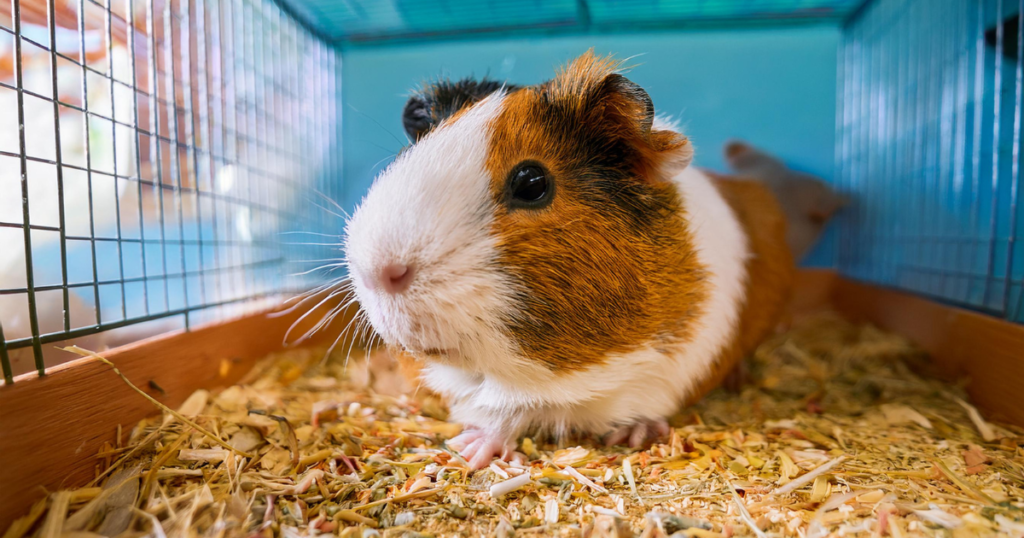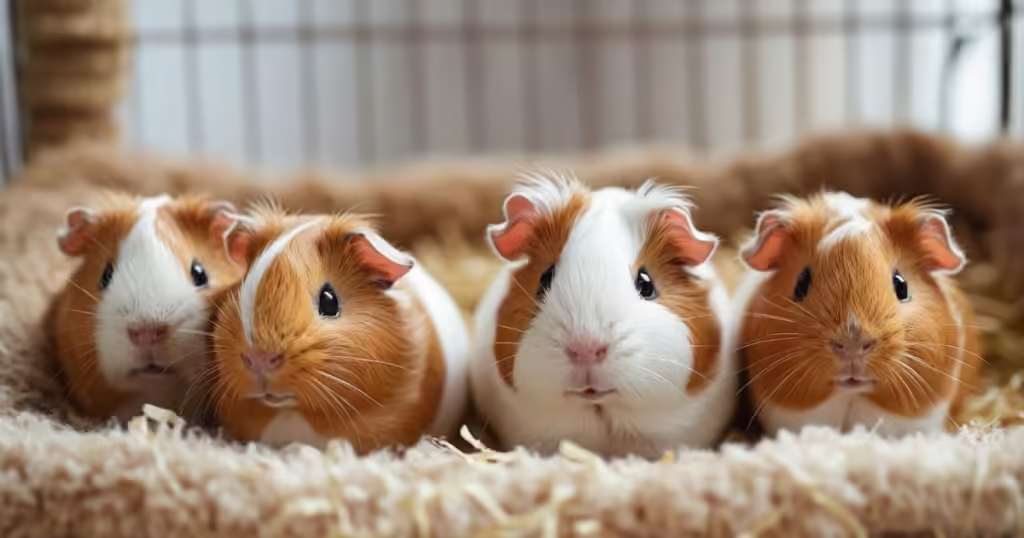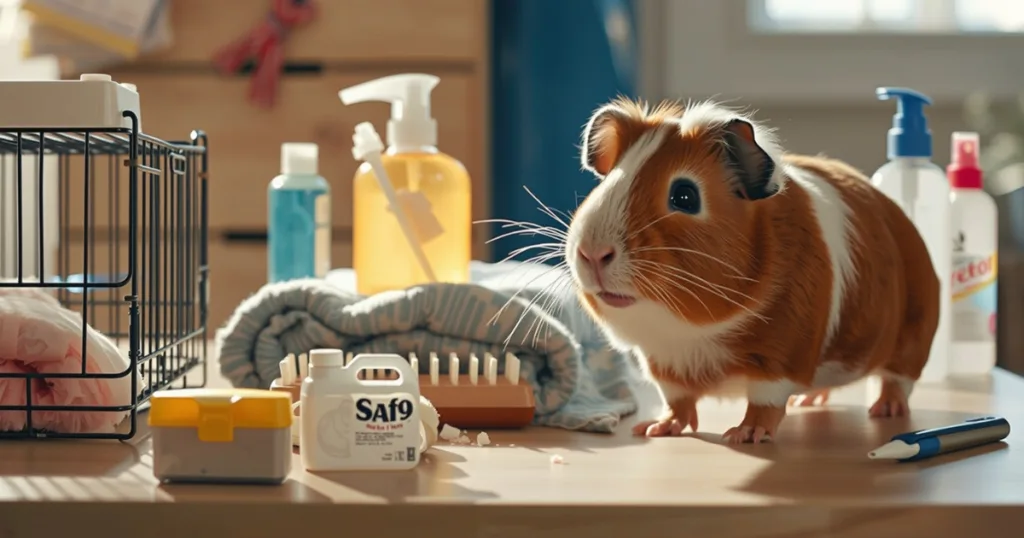Choosing the best guinea pig litter isn’t just about keeping your pet’s habitat clean—it’s about ensuring their comfort, health, and your home’s freshness. Odor control is one of the biggest challenges guinea pig owners face, and the wrong litter can lead to unpleasant smells, frequent cleaning, and even health risks for your furry friend.

In this guide, we’ll help you choose the perfect guinea pig litter for odor control by exploring the top options, their pros and cons, and maintenance tips to keep your pet’s cage fresh and odor-free.
Why Choosing the Right Guinea Pig Litter Matters
Guinea pigs are small animals with sensitive respiratory systems. Poorly chosen litter can lead to odor problems and put your guinea pig’s health at risk. The ideal litter absorbs moisture, minimizes smells, and is safe for your pet to interact with.
Key Benefits of Choosing the Right Guinea Pig Litter:
- Keeps the cage dry and clean.
- Controls unpleasant odors effectively.
- Promotes your guinea pig’s overall well-being.
- Reduces the frequency of full cage cleanings.
According to Guinea Lynx, ensuring the cage remains clean and odor-free is critical for preventing respiratory issues, one of the most common health concerns for guinea pigs.
Top Guinea Pig Litter Options for Odor Control
1. Paper-Based Litter: The Best Overall Option
Paper-based litter is often considered the gold standard for guinea pigs. It’s highly absorbent and designed specifically to trap odors, making it a favorite among guinea pig owners.

Why It’s Great for Odor Control
Paper-based litter is highly efficient at absorbing moisture, which helps significantly reduce odors. It’s soft, dust-free, and safe for guinea pigs, including those with respiratory issues.
Pros:
- Superior odor control and moisture absorption.
- Soft and gentle on guinea pigs’ delicate feet.
- Dust-free, making it safe for respiratory health.
- Eco-friendly, made from recycled paper.
Cons:
- Slightly more expensive than other types of litter.
- Requires regular replacement for consistent odor control.
Best Brands to Consider:
- Carefresh Natural Paper Bedding
- Kaytee Clean & Cozy
Pro Tip: Stick to unscented varieties to avoid irritating your guinea pig’s sensitive nose.
2. Fleece Liners: Reusable and Odor-Resistant
For eco-conscious guinea pig owners, fleece liners are a great alternative to disposable litter. These washable liners are soft, comfortable, and reusable.

Why It’s Great for Odor Control
Fleece liners wick moisture away from the surface when combined with absorbent layers underneath, keeping it dry and odor-free.
Pros:
- Washable and reusable, reducing waste.
- Cost-effective over time.
- Comfortable for guinea pigs to walk on.
- Provides good odor control when maintained properly.
Cons:
- Requires frequent washing and maintenance.
- Higher upfront cost compared to disposable options.
- Needs daily spot cleaning to prevent odor buildup.
Pro Tip: Pair fleece liners with absorbent pads underneath for maximum odor absorption.
3. Aspen Shavings: A Natural and Affordable Choice
Aspen shavings are a natural and budget-friendly option for guinea pig litter. Unlike cedar or pine, aspen is safe for guinea pigs because it doesn’t contain harmful aromatic oils.

Why It’s Great for Odor Control
Aspen is naturally absorbent, which helps reduce odors, but it requires regular cleaning to be effective.
Pros:
- Affordable and widely available.
- Free of harmful chemicals or oils.
- Naturally absorbent, helping manage odors.
Cons:
- Can produce dust, which may irritate sensitive guinea pigs.
- Needs frequent replacement to remain effective.
Pro Tip: Make sure to purchase aspen shavings specifically labeled as dust-free.
4. Pellet Litter: Heavy-Duty Odor Absorption
Pellet litter, made from compressed paper or wood, is highly absorbent and long-lasting. It’s an excellent choice for guinea pig owners who prioritize odor control.

Why It’s Great for Odor Control
Pellets are dense and can absorb large amounts of moisture and odors, making them one of the most effective options available.
Pros:
- Exceptional odor and moisture absorption.
- Long-lasting, reducing the need for frequent changes.
- Made from safe, natural materials.
Cons:
- Harder surface, which may be uncomfortable for guinea pigs.
- Heavier than other litter types, making it harder to clean.
Pro Tip: Combine pellet litter with a soft bedding layer to improve your guinea pig’s comfort.
5. Hay as Litter: Multi-Functional but Limited
Hay is a staple in a guinea pig’s diet, but it’s also sometimes used as litter. While it’s safe and natural, hay isn’t the most effective for controlling odors.
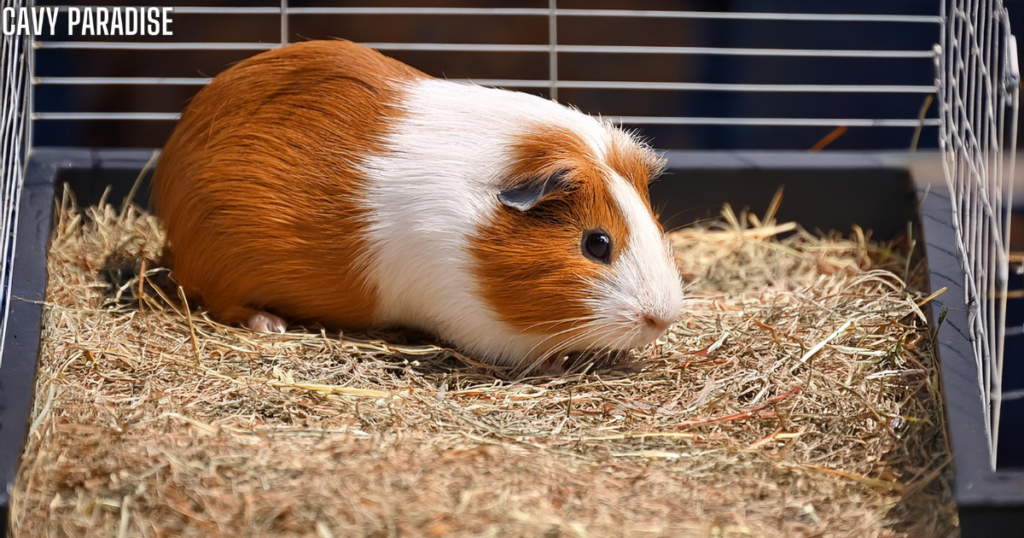
Why It’s Great for Odor Control
On its own, hay doesn’t offer strong odor control, but it can work when paired with an absorbent base layer.
Pros:
- Safe and natural for guinea pigs.
- Multi-purpose: serves as both bedding and food.
- Guinea pigs enjoy burrowing in it.
Cons:
- Poor odor control when used alone.
- Requires frequent replacement to stay fresh.
- Can be more expensive than other options.
Pro Tip: Use hay as a top layer over a more absorbent litter type.
Types of Litter to Avoid
Some litter types can harm your guinea pig or fail to control odors effectively. Avoid these options:

- Clay-Based Cat Litter: Dusty and dangerous if ingested.
- Cedar or Non-Kiln-Dried Pine Shavings: Contain harmful oils that can irritate guinea pigs’ respiratory systems.
- Corn Cob Litter: Prone to mold and ineffective at absorbing odors.
- Scented Litter: Can irritate your guinea pig’s nose and lungs.
How to Keep Your Guinea Pig Cage Odor-Free
No matter which litter you choose, maintaining a clean habitat is key to controlling odors.
Tips for a Fresh Cage:
- Daily Spot Cleaning: Remove soiled litter, hay, and feces daily to prevent odors from building up.
- Weekly Deep Cleaning: Replace all litter and disinfect the cage once a week to eliminate bacteria and smells.
- Use an Absorbent Base Layer: Pair fleece liners or hay with absorbent pads for better odor management.
- Ensure Proper Ventilation: Place the cage in a well-ventilated area to reduce odor concentration.
- Odor Neutralizers: Use pet-safe sprays or baking soda around the cage area (not inside the cage) for extra freshness.
Keep It Spotless: How to Clean Your Guinea Pig Cage Quickly
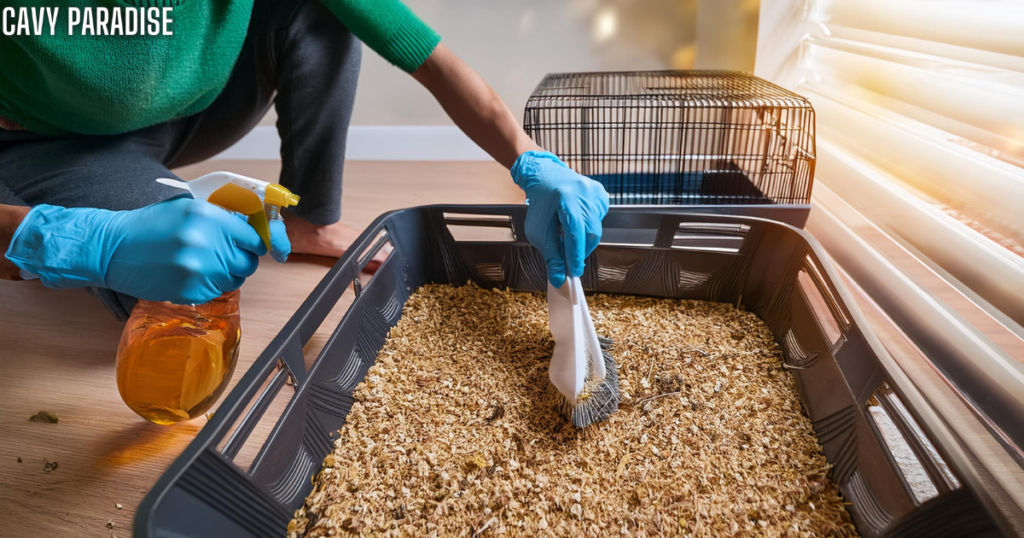
Frequently Asked Questions About Guinea Pig Litter
1. What is the best litter for guinea pigs to control odor?
The best litter for guinea pigs to control odor is paper-based litter, as it is highly absorbent, dust-free, and designed specifically to trap odors. Other good options include fleece liners with absorbent layers and pellet litter for heavy-duty odor absorption.
2. Can I use cat litter for guinea pigs?
No, cat litter is not safe for guinea pigs. Most cat litters are dusty and can cause respiratory issues in guinea pigs. Additionally, clumping litter can be dangerous if ingested, leading to serious health problems.
3. How often should I change my guinea pig’s litter?
You should spot clean your guinea pig’s cage daily by removing soiled litter and replace all bedding or litter weekly. If using fleece liners, wash them every 3–4 days, depending on odor and waste buildup.
4. What are the signs that my guinea pig’s litter needs changing?
Signs include a noticeable odor, damp or wet litter, and visible waste buildup. Guinea pigs may also start avoiding certain areas of the cage if the litter becomes too soiled.
5. Is scented litter safe for guinea pigs?
No, scented litter is not safe for guinea pigs. The artificial scents can irritate their sensitive respiratory systems. Always choose unscented litter to ensure your pet’s health and comfort.
Conclusion: The Best Guinea Pig Litter for Odor Control
Choosing the right guinea pig litter for odor control comes down to your pet’s needs and your preferences. For most owners, paper-based litter is the top choice for its superior absorbency and odor control. If you prefer a reusable option, fleece liners are both sustainable and effective. On a budget? Aspen shavings or pellet litter offer great alternatives.
By combining the right litter with regular cleaning and maintenance, you can create a fresh, healthy, and comfortable environment for your guinea pig. A clean cage not only ensures your guinea pig’s happiness but also enhances your experience as a pet owner.

